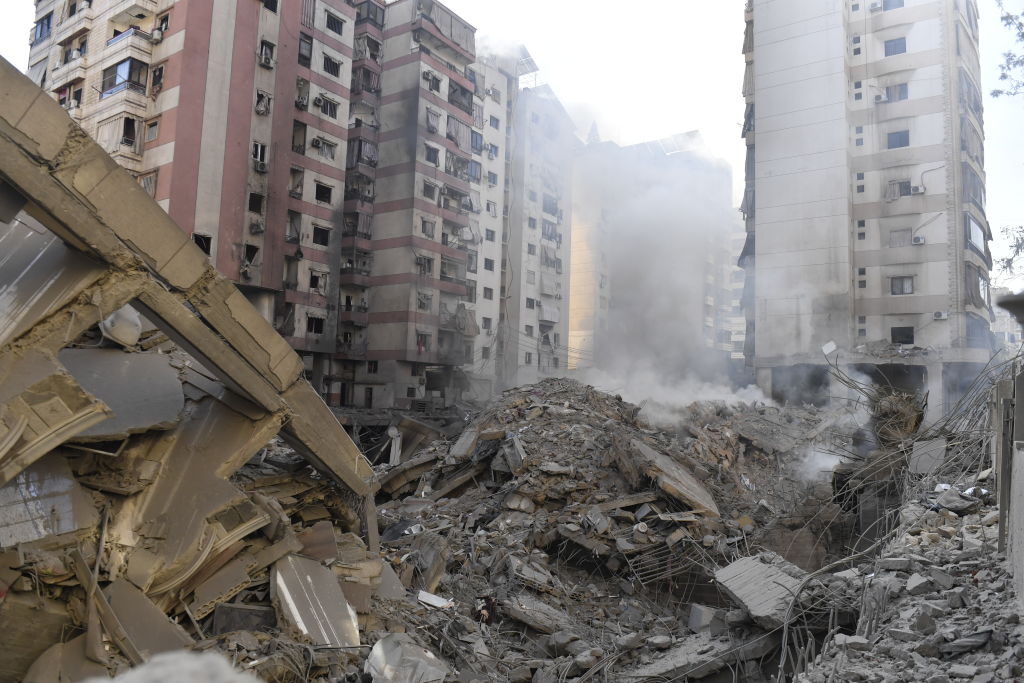Israeli strikes sealed off Lebanon’s main border crossing with Syria early on Friday, hours after an intense Israeli attack on Beirut’s southern suburbs that is thought to have targeted the heir apparent to Hezbollah’s slain secretary general.
The strikes added to fears inside Lebanon that Israel’s targeting of Iran-backed Lebanese Hezbollah militants will bring an all-out conflict, with Israel also poised to respond to Tuesday’s Iranian missile barrage on its territory. U.S. President Joe Biden said on Thursday Israel’s response could include a strike on Iran’s oil facilities.
Lebanese Transport Minister Ali Hamieh told Reuters Friday’s strike on the Syrian border hit inside Lebanese territory near the crossing, creating a four-metre (12 feet) wide crater.
The Israeli Defense Forces (IDF) had accused Hezbollah on Thursday of using the crossing with Syria to transport military equipment into Lebanon.
“The IDF will not allow the smuggling of these weapons and will not hesitate to act if forced to do so, as it has done throughout this war,” IDF spokesman Avichay Adraee said on X.
According to Lebanese government statistics, more than 300,000 people – a vast majority of them Syrian – had crossed from Lebanon into Syria over the last 10 days to escape escalating Israeli bombardment.
The southern suburb of Dahiye, a stronghold of the Iran-backed Hezbollah, came under renewed strikes near midnight on Thursday after Israel ordered people to leave their homes in some areas, residents and security sources said.
The air raids targeted Hezbollah official Hashem Safieddine, rumoured successor to its assassinated leader Hassan Nasrallah, in an underground bunker, Axios reporter Barak Ravid said on X, citing three Israeli officials.
Safieddine’s fate was not clear, he said.
Israel’s military declined comment and Hezbollah made no comment on Safieddine’s fate.
Huge explosions shook the sky in the vicinity of Beirut’s main airport in the early hours of Friday, and Lebanese civilians said they were living in constant fear.
“It’s like you’re alive but not alive. We’re alive but don’t know for how long, we’re alive but don’t know when the rockets will hit you and your family,” said Nouhad Chaib, a 40-year-old man already displaced from the south.
The Israeli military on Friday told the residents of over 20 southern towns in Lebanon to evacuate immediately, spokesperson Avichay Adraee said on X as Israel pressed ahead with its incursions in the region. Nearly 90 villages in the south have been told to evacuate so far, as well as parts of Beirut’s southern suburbs.
Three Hezbollah-linked rescue workers were wounded by a strike in a southern suburb, a Lebanese security source told Reuters.
Lebanon’s Hezbollah announced several attacks on Friday at positions within Israel, including a salvo of missiles on Israel’s Ilania base.
Iran’s Foreign Minister Abbas Araqchi landed in Beirut on Friday, according to Lebanese state media. He is set to meet Lebanon’s caretaker Prime Minister Najib Mikati and speaker of parliament Nabih Berri, who is a close ally of Hezbollah.
OIL TARGET?
U.S. President Joe Biden said he did not believe there is going to be an “all-out war” in the Middle East, as Israel weighs options for retaliation, but that more needed to be done to prevent one.
While the United States, the European Union, and other allies have called for an immediate 21-day ceasefire in the Israel-Lebanon conflict, Biden said the U.S. was discussing with Israel its options for responding to Tehran’s assault, which included Israel striking Iran’s oil facilities.
His comments contributed to a surge in global oil prices, and rising Middle East tension has made traders worry about potential supply disruptions.
However, Biden added: “There is nothing going to happen today.” Asked later if he was urging Israel not to attack Iran’s oil installations, Biden said he would not negotiate in public.
On Wednesday, the president said he would not support any Israeli strike on Iran’s nuclear sites.
Israeli Prime Minister Benjamin Netanyahu has vowed Iran will pay for Tuesday’s missile attack, and Washington has said it would work with its longtime ally to ensure Iran faced “severe consequences.”
Iranian President Masoud Pezeshkian, speaking in Doha, said on Thursday that Tehran would be ready to respond.
“Any type of military attack, terrorist act or crossing our red lines will be met with a decisive response by our armed forces,” he said.
Nations worldwide have prepared contingency plans to evacuate citizens from Lebanon after a dramatic escalation in the conflict between Israel and the Lebanese armed movement Hezbollah.
Although no country has launched a large-scale military evacuation yet, some are chartering aircraft. People are also fleeing on their own.
Israel, which has been fighting Hamas in the Palestinian territory of Gaza for almost a year, sent troops into southern Lebanon on Tuesday after two weeks of intense airstrikes.
Israel says its operations in Lebanon seek to allow tens of thousands of its citizens to return home after Hezbollah bombardments during the Gaza war forced them to evacuate from its north.
More than 1.2 million Lebanese have been displaced by Israeli attacks, and nearly 2,000 people have been killed since the start of the Israeli attacks on Lebanon over the last year, most of them in the past two weeks, Lebanese authorities said.
Hezbollah says it has repelled several land operations by Israeli troops, with measures such as ambushes and direct clashes.
(Reuters)




















